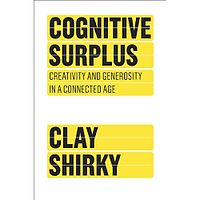- Cognitive Surplus
-
Cognitive Surplus: Creativity and Generosity in a Connected Age 
First edition hardcoverAuthor(s) Clay Shirky Language English Genre(s) Non-fiction Publisher Penguin Group Media type Print (Hardback) Pages 242 ISBN 978-1594202537 Cognitive Surplus: Creativity and Generosity in a Connected Age is a 2010 non-fiction book by Clay Shirky. The book is an indirect sequel to Shirky's Here Comes Everybody, which covered the impact of social media.
Contents
Summary
The book's central theme is that people are now learning how to use more constructively the free time afforded to them since the 1940s for creative acts rather than consumptive ones, particularly with the advent of online tools that allow new forms of collaboration.[1] It goes on to catalog the means and motives behind these new forms of cultural production, as well as key examples.
While Shirky acknowledges that the activities that we use our cognitive surplus for may be frivolous (such as creating LOLcats),[2] the trend as a whole is leading to valuable and influential new forms of human expression. He also asserts that even the most inane forms of creation and sharing are preferable to the hundreds of billions of hours spent consuming television shows in countries such as the United States.[2] He sees compulsive television viewing as the modern equivalent of the Gin Craze, presenting both as maladaptive and self-anesthetizing responses to epochal social disruptions. The mass bingeing, stoked by nightmarish urbanization during the Industrial Revolution, ended when English society evolved "new urban realities created by London's incredible social density, [...] turn[ing] London into [...] a modern city, one of the first."[3]
What made the craze subside wasn't any set of laws. Gin consumption was treated as a problem to be solved, when in fact it was a reaction to the real problem—dramatic social change and the inability of older social civic models to adapt. [...] Many of the institutions [... of] "the industrialized world" actually arose in response to the social climate created by industrialization, rather than to industrialization itself. Mutual aid societies provided shared management of risk outside the traditional ties of kin and church. The spread of coffeehouses and later restaurants was spurred by concentrated populations. Political parties began to recruit from the urban poor and to field candidates more responsive to them.
— Shirky, Cognitive Surplus: Creativity and Generosity in a Connected Age, p. 3
Chapter list
- Gin, Television, and Cognitive Surplus - comparison of the Gin Craze to contemporary television viewing habits, and speculation on what people would do if not watching television
- Means - discussion of protests on United States beef imports in South Korea as organized by fans of boyband TVXQ, and more generally the ability of anyone to publish online
- Motive - gives case of Josh Groban's fans spontaneously organizing an online charity project in his name; discussion of fan fiction
- Opportunity - gives case of the Z-boys skateboarding in abandoned California swimming pools; discusses ultimatum game in context of internet resources; describes history of Apache HTTP Server and Napster software
- Culture - discusses the difference between a fee and a fine in marketing; gives a history of the Invisible College; talks about online coursework collaboration at universities; reviews the PatientsLikeMe website
- Personal, Communal, Public, Civic - discussion of why CouchSurfing and eBay websites work
- Looking for the Mouse - a history of publishing and some advice for modern business practices
Critical response
Cognitive Surplus has been widely praised as another convincing installment in Shirky's long history of thought leadership among academics and writers who study the Internet and its effect on society.[4][5] However, his approach has been criticized by the likes of Farhad Manjoo in The New York Times for being too academic and for cheerleading positive examples of the online use of cognitive surplus.[1] Author Jonah Lehrer criticized what he saw as Shirky's premise that forms of consumption, cultural consumption in particular, are inherently less worthy than producing and sharing.[6]
See also
- Drive, Daniel H. Pink
- The Shallows, Nicholas G. Carr
References
- ^ a b Manjoo, Farhad (August 8, 2010). "When the Screen Goes Blank". The New York Times Book Review. http://www.nytimes.com/2010/08/08/books/review/Manjoo-t.html.
- ^ a b Walker, Tim (July 16, 2010). "Cognitive Surplus, By Clay Shirky". The Independent. http://www.independent.co.uk/arts-entertainment/books/reviews/cognitive-surplus-by-clay-shirky-2027393.html.
- ^ Shirky, Clay (2010). Cognitive Surplus: Creativity and Generosity in a Connected Age. Penguin. pp. 1–3. ISBN 978-1594202537.
- ^ Chatfield, Tom (June 27, 2010). "Cognitive Surplus by Clay Shirky". The Guardian. http://www.guardian.co.uk/books/2010/jun/27/cognitive-surplus-clay-shirky-book-review.
- ^ Harkin, James (July 5, 2010). "Cognitive Surplus". The Financial Times. http://www.ft.com/cms/s/2/3a655a9a-8564-11df-aa2e-00144feabdc0.html.
- ^ Lehrer, Jonah (June, 9 2010). "Cognitive Surplus". bnreview.barnsandnoble.com. http://bnreview.barnesandnoble.com/t5/Reviews-Essays/Cognitive-Surplus/ba-p/2733.
External links
Categories:- 2010 books
- Technology books
- Social media
- Web 2.0
- Leisure
Wikimedia Foundation. 2010.
